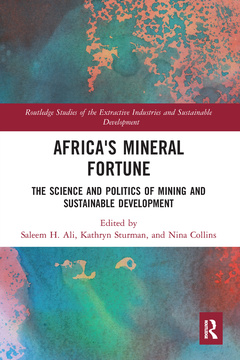Description
Africa's Mineral Fortune
The Science and Politics of Mining and Sustainable Development
Routledge Studies of the Extractive Industries and Sustainable Development Series
Coordinators: Ali Saleem H., Sturman Kathryn, Collins Nina
Language: English
Subjects for Africa's Mineral Fortune:
Keywords
Socioeconomic Development; Socio-economic Development; African Development Bank; Africa Mining Vision; Small Scale Mining; Large Scale Mining Companies; Extractive Industries Transparency Initiative; Sustainability Certification Schemes; ASM Sector; Large Scale Mining Operations; ASM Community; ASM Activity; Platinum Group Metals; Managing Mining Waste; Large Scale Mining; African Mining Vision; Natural Resource Governance Institute; Human Development Index; Small Scale Mining Sector; Mining Life Cycle; Chinese OFDI; Highly Pathogenic Avian Influenza; Local Development; WAC; Middle East Respiratory Syndrome Coronavirus
Publication date: 06-2020
· 15.6x23.4 cm · Paperback
Publication date: 08-2018
· 15.6x23.4 cm · Hardback
Description
/li>Contents
/li>Readership
/li>Biography
/li>
For too long Africa's mineral fortune has been lamented as a resource curse that has led to conflict rather than development for much of the continent. Yet times are changing and the opportunities to bring technical expertise on modern mining alongside appropriate governance mechanisms for social development are becoming more accessible in Africa.
This book synthesizes perspectives from multiple disciplines to address Africa?s development goals in relation to its mineral resources. The authors cover ways of addressing a range of policy challenges, environmental concerns, and public health impacts and also consider the role of globalization within the extractive industries. Academic research is coupled with key field vignettes from practitioners exemplifying case studies throughout. The book summarizes the challenges of natural resource governance, suggesting ways in which mining can be more effectively managed in Africa. By providing an analytical framework it highlights the essential intersection between natural and social sciences, central to efficient and effective harnessing of the potential for minerals and mining to be a contributor to positive development in Africa.
It will be of interest to policy makers, industry professionals, and researchers in the extractive industries, as well as to the broader development community.
INTRODUCTION Part I: The politics of African mining 1. Harmonizing African resource politics? Lessons from the African Mineral Development Centre 2. Evaluating conflict risks in Africa’s resource governance 3. Chinese mining in Africa and its global controversy 4. Field Vignette. Moving from prescriptive to performance-based regulation: the case of waste management 5. Field Vignette. Ghana’s policy on artisanal and small-scale mining Part II: Data and models: supporting strategic planning for Africa’s minerals 6. Developing accurate and accessible geoscience data for sustainable mining in Africa 7. Challenges in measuring the local and regional contributions of mining: lessons from case studies in Rwanda, Zambia, and Ghana 8. Measuring transformative development from mining: a case study of Madagascar 9. Field Vignette. The Extractives Dependence Index and its impact on Africa 10. Field Vignette. The West African Exploration Initiative (WAXI) as a model for collaberative research and development Part III: Environment, health, and innovation 11. Conservation priorities and extractive industries in Africa: opportunities for conflict prevention 12. Ebola and other emerging infections: managing risks to the mining industry 13. Mineral investment decision-making in Africa: a real options approach in integrating price and environmental risks 14. The potential of Zambian copper-cobalt metallophytes for phytoremediation of minerals wastes 15. Field Vignette. South Africa’s underground women miners 16. Field Vignette. Sapphire mining, water, and maternal health in Madagascar Part IV: Reconciling scales of mining governance 17. Strategies for working with artisanal and small-scale miners in sub-Saharan Africa 18. Artisanal and small-scale mining community health, safety, and sanitation: a water focus 19. Gauging the effectiveness of certification schemes and standards for responsible mining in Africa 20. Field Vignette. The Australia–Africa Minerals and Energy Group (AAMEG) 21. Field Vignette. Sourcing "conflict-free" minerals from Central Africa CONCLUSION: a multi-faceted fortune
Saleem H. Ali is Blue and Gold Distinguished Professor of Energy and the Environment at the University of Delaware, USA. He also holds Adjunct Professor status for both the Global Change Institute and the Sustainable Minerals Institute at the University of Queensland, Australia, where he previously served as Chair in Sustainable Resource Development and Professor of Sustainability Science and Policy.
Kathryn Sturman is Senior Research Fellow at the Centre for Social Responsibility in Mining at the Sustainable Minerals Institute, University of Queensland, Australia. She is an international relations specialist in resource governance and policy considerations of mining for human security and development.
Nina Collins is the Mining Advocacy Coordinator at Oxfam Australia, focusing on the operations of Australian mining, oil, and gas companies operating in developing countries and their impacts on communities. She is also an Industry Fellow at the Centre for Social Responsibility in Mining, Sustainable Minerals Institute, University of Queensland, Australia.
These books may interest you

Mineral Deposits of North Africa 210.99 €

Mineral Deposits of North Africa 210.99 €


